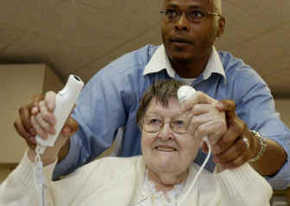|
|
'Wii-habilitation'
Provides Fun and Exercise for Senior Citizens
By Donald Bradley, Kansas City Star
August 11, 2008

Darrick Bronson, an occupational
therapist, assisted Doris Strong with her jab as she played a boxing game on the
Wii at Carondelet Manor in Kansas City. Wii is being used by health
professionals in nursing facilities for exercise.
From her wheelchair, Doris Strong jabbed with her right.
Her corner wanted her to use her left.
“Hit him in the face!” an occupational therapist urged her.
“Uppercut!” said another. “Your left! Your left!”
Strong, smiling like a sweet grandma on Thanksgiving, threw a combination that staggered her opponent against the ropes, and down he went.
“Way to go, Doris!” cheered someone in the small crowd that had gathered in the therapy room at the Carondelet Manor nursing facility next to St. Joseph Medical Center.
Strong turned to one of the therapists and asked softly, “Are we going to bowl now?”
And just like that, the boxing ring on the 50-inch, flat-screen Sony television turned into a bowling alley.
Wii (pronounced “we”) has become a big hit with senior citizens. It’s the first video game system to crack the demographic that grew up in the days before television.
In retirement communities and senior centers across the country, residents are getting together and playing Nintendo’s Wii, which uses a wireless remote to transfer body movements to an animated character on the screen.
They go through the motions of hitting a baseball, swinging a tennis racket and driving a golf ball off a tee. Some places even have Wii bowling leagues.
Beyond the fun of taking seniors back to the games of their youth, Wii increasingly is being used by health professionals in nursing facilities to improve balance, endurance, range of motion, hand-eye coordination and sequencing abilities.
The occupational therapists at Carondelet Manor weren’t really rooting for Doris Strong to KO her boxing opponent. They wanted her to aim for a target, thrust her arms — both of them — and build endurance.
Dee Leman, regional director of rehabilitation for long-term care at Carondelet facilities, said Wii is great for the cardiovascular system and coordination and also helps ease the mental frustration of patients who are going through a tough time after a stroke or orthopedic injury, for example.
“We used to have those patients throw a ball back and forth,” Leman said. “Well, how many times can you throw a ball before that gets old?”
•••
Wii hit the American market in late 2006. It’s unclear how soon it was first used in therapy for seniors.
“But no question it’s popping up all over the place now,” Maureen Peterson of the American Occupational Therapy Association said Friday from her office in Bethesda, Md.
The key to “Wii-habilitation,” she said, is that it is so fun and engaging, patients don’t even realize the fitness benefits. That is something occupational therapists are always looking for. Because if patients like the activity, they are more willing to do it.
Some of the games provide more of a workout than patients have had in years.
“My husband and I tried Wii for the first time recently, and we woke up the next day with sore muscles we didn’t know we had, and I’m 55,” Peterson said.
“It’s quite amazing.”
Nintendo, the Japanese electronics giant that captured a younger generation’s zeal with Donkey Kong, Super Mario Bros. and Game Boy, knows a lot of Wii units are going to retirement communities and nursing facilities, but it can’t say how many seniors are playing.
“But considering that prior to Wii the number of console-playing seniors was about zero, I’ll say it’s an infinite jump,” said Denise Kaigler, a vice president for Nintendo of America.
More Information on US Health Issues
|
|



